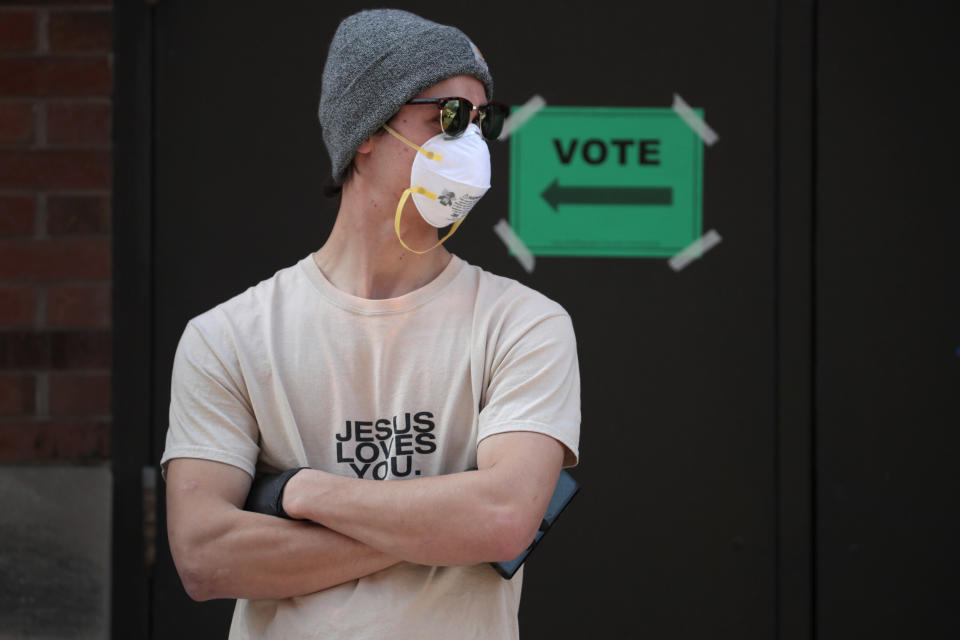Liberals Prevail In Wisconsin's Contentious Coronavirus Judicial Election
Last Tuesday, Wisconsin held its presidential primary and state and local elections despite an outcry against voter suppression while the state has been under a stay-at-home order amid the coronavirus pandemic. Efforts to postpone the election or expand absentee voting failed after they were opposed by Wisconsin Republicans and shot down by conservative judges. Democrats called the conditions under which the election was held “voter suppression on steroids.”
The results of the presidential primary are more or less meaningless: Sen. Bernie Sanders (I-Vt.) dropped out of the running the day after Wisconsin held its elections and has since endorsed former Vice President Joe Biden, now the presumptive Democratic nominee. That said, Sanders will remain on the ballot and has said he will use his margin of delegates to influence Biden’s platform. On Monday, Sanders endorsed Biden’s bid.
But arguably the most important election in Wisconsin was for the state’s Supreme Court. Incumbent Dan Kelly, who was appointed by former Republican Gov. Scott Walker and endorsed by President Donald Trump, faced a challenge from Jill Karofsky, a Wisconsin circuit court judge endorsed by Democratic Party politicians. Karofsky won.
The top court in Wisconsin will now have a partisan tilt of four conservative judges to three liberals after Karofky’s victory. The partisan lean of the court is vital as Wisconsin Republicans in the Legislature have used their heavily gerrymandered majority to strip power from Democratic Gov. Tony Evers with support from their allies on the court.
Wisconsin Democrats accused Republicans of trying to suppress the vote in order to protect Kelly’s seat. Wisconsin Republicans have had an eye on this election date for some time: During a 2018 lame-duck session with Walker still in office, the Republican majority tried to keep the state Supreme Court race off the presidential primary ballot. Then they voted against every attempt by Evers to postpone in-person voting and expand absentee balloting. Wisconsin Republicans were ultimately able to win two court cases — one in the state’s Supreme Court and one in the U.S. Supreme Court, which ultimately kept in-person voting close to the status quo despite the pandemic.

“This whole thing is political,” Lt. Gov. Mandela Barnes told HuffPost on election day last week. “This is the fallacy of nonpartisan courts. They knew exactly who to run to. They knew they could get exactly what they wanted politically through the Supreme Court here and the U.S. Supreme Court.”
Though the state reported record-shattering absentee voting for a spring election, few residents bothered to show up at the small number of crowded polling sites that remained open. In Milwaukee, the state’s most populous and diverse city, only five polling sites out of the usual 180 were opened, due to the reluctance of many volunteer poll workers to interact with the public during the health crisis.
More than 1 million Wisconsin voters cast their ballots by mail. But nearly 12,000 absentee ballots that were requested were never sent out. There are reports that even more absentee ballots that were sent to voters did not arrive at their destination. Many voters were left with the difficult decision of whether to vote in person amid coronavirus warnings after their requested absentee ballots never arrived.
An additional problem created by the chaotic last-minute legal challenges to the election was the requirement, imposed by the U.S. Supreme Court in a 5-4 decision, that the state could count absentee ballots received by April 13 as long as they had an official postmark stating they were sent on April 7. Hundreds, or possibly thousands, of ballots, however, did not receive the necessary postmark to be counted.
The Milwaukee Elections Commission has asked the U.S. Postal Service to investigate the lack of postmarking of some absentee ballots. As it waited for results, the city commission voted 2-1 to count 390 absentee ballots with questionable postmarks.
Despite the seeming end to the election, the legal wrangling continues. Fourteen plaintiffs filed a federal lawsuit on Monday claiming their rights under the Voting Rights Act and the Americans With Disabilities Act had been infringed because they never received absentee ballots.
A HuffPost Guide To Coronavirus
Stay up to date with our live blog as we cover the COVID-19 pandemic
What you need to know about face masks right now
How long are asymptomatic carriers contagious?
Lost your job due to coronavirus? Here’s what you need to know.
Can someone outside of your household quarantine with you now?
Everything you need to know about coronavirus and grief
What coronavirus questions are on your mind right now? We want to help you find answers.
Everyone deserves accurate information about COVID-19. Support journalism without a paywall — and keep it free for everyone — by becoming a HuffPost member today.
Love HuffPost? Become a founding member of HuffPost Plus today.
This article originally appeared on HuffPost.

